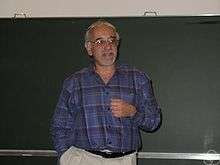Eduardo D. Sontag
| Eduardo Daniel Sontag | |
|---|---|
 Sontag at a 2009 control theory workshop in Oberwolfach | |
| Born |
1951 Buenos Aires, Argentina |
| Residence | U.S. |
| Nationality | U.S. |
| Fields | Control theory |
| Institutions | State University of New Jersey |
| Alma mater |
University of Florida University of Buenos Aires |
| Thesis | On the Internal Realization of Polynomial Response Maps (1976) |
| Doctoral advisor | Rudolf Kalman |
| Doctoral students | Francesca Albertini, Madalena Chaves, German Enciso, Brian Ingalls, Renee Koplon, Mikhail Krichman, Yuandan Lin, Todd Riley, Hava Siegelmann, Liming Wang, Yuan Wang, Amelia White |
Eduardo Daniel Sontag (born 1951 in Buenos Aires, Argentina) is an American mathematician, and Professor at the Rutgers University, who works in the field of systems biology and control theory and engineering.
Biography
Sontag received his Licenciado degree from the Mathematics Department[1] at the University of Buenos Aires in 1972, and his Ph.D. in Mathematics under Rudolf Kalman at the Center for Mathematical Systems Theory at the University of Florida in 1976.
Since 1977, Sontag has been with the Department of Mathematics[2] at Rutgers University, The State University of New Jersey, where he is currently Professor of Mathematics as well as a Member of the Graduate Faculties of the Department of Computer Science[3] and of the Department of Electrical and Computer Engineering.[4] He is also the director of SYCON, the Rutgers Center for Systems and Control, and is a co-founder and Member of the Steering Committee of the BioMaPS Institute for Quantitative Biology.[5]
He is in the Editorial Board of IEE Proceedings Systems Biology,[6] SIAM Review[7] Synthetic and Systems Biology[8] International Journal of Biological Sciences,[9] Journal of Computer and Systems Sciences,[10] and Neural Computing Surveys (Board of Advisors), and a former Board member of IEEE Transactions in Automatic Control, Systems and Control Letters, Dynamics and Control, Neurocomputing, Neural Networks, Control-Theory and Advanced Technology, and Control, Optimization and the Calculus of Variations. In addition, he is a co-founder and co-managing editor of Mathematics of Control, Signals, and Systems.[11]
He has been Program Director and Vice-Chair of the Activity Group in Control and Systems Theory of Society for Industrial and Applied Mathematics (SIAM). He has been a member of several committees at SIAM and the American Mathematical Society, and is a former Chair of the Committee on Human Rights of Mathematicians of the latter.
Work
His work in control theory led to the introduction of the concept of input to state stability (ISS), a stability theory notion for nonlinear systems, and control-Lyapunov functions. Many of the subsequent results were proved in collaboration with his student Yuan Wang and with David Angeli. In systems biology, Sontag introduced together with David Angeli the concept of input/output monotone system. In theory of computation, he proved the first results on computational complexity in nonlinear controllability, and introduced together with his student Hava Siegelmann a new approach to analog computation and super-Turing computing.
Awards and honors
Sontag is an Institute of Electrical and Electronics Engineers (IEEE) Fellow. He was awarded the Reid Prize in Mathematics[12] in 2001, the 2002 Hendrik W. Bode Lecture Prize[13] from the IEEE, the 2002 Board of Trustees Award for Excellence in Research from Rutgers University, the 2005 Teacher/Scholar Award from Rutgers University, and the 2011 IEEE Control Systems Award.[14][15] In 2012 he became a fellow of the American Mathematical Society.[16]
Publications
He has authored three books and is an ISI Highly Cited researcher:[17]
- 1972, Topics in Artificial Intelligence (in Spanish, Buenos Aires: Prolam, 1972)
- 1979, Polynomial Response Maps (Berlin: Springer, 1979).
- 1989, Mathematical Control Theory: Deterministic Finite Dimensional Systems (Texts in Applied Mathematics, Volume 6, Second Edition, New York: Springer, 1998)
References
- ↑ Mathematics Department, University of Buenos Aires
- ↑ Department of Mathematics, Rutgers University
- ↑ Department of Computer Science
- ↑ Department of Electrical and Computer Engineering.
- ↑ BioMaPS
- ↑ IEE Proceedings Systems Biology
- ↑ SIAM Review,
- ↑ Synthetic and Systems Biology,
- ↑ International Journal of Biological Sciences
- ↑ Journal of Computer and Systems Sciences
- ↑ (MCSS
- ↑ Reid Prize in Mathematics
- ↑ Hendrik W. Bode Lecture Prize
- ↑ "IEEE Control Systems Award Recipients" (PDF). IEEE. Retrieved March 30, 2011.
- ↑ "IEEE Control Systems Award". IEEE Control Systems Society. Retrieved March 30, 2011.
- ↑ List of Fellows of the American Mathematical Society, retrieved 2013-07-26.
- ↑ Link to publication list).